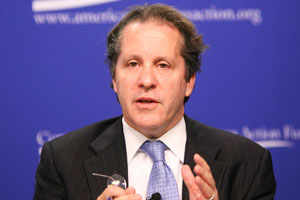Earlier today, I posted a piece that looked at the criticism that Gene Sperling, who seems likely to be named Lawrence Summers’ replacement at the White House, is a Wall Street insider. My verdict: he ain’t. I reported on how he came to make a boatload of money working on a $100 million charitable project for Goldman Sachs’ foundation. In that piece, I noted that Reuters blogger Felix Salmon was one of Sperling’s critics, and he’s quasi-responded in a post assailing “the revolving door” between Washington and Wall Steet. He writes:
It’s fascinating to see how Corn reports on the institutionalization of the revolving door between Wall Street and Washington, to the point where taking $887,727 from Goldman Sachs is positively self-abnegatory.
Given our age difference, I’d wager I have spent far more years decrying this revolving door than Salmon. My point was not to discount the problem of the revolving door; it was to show that Sperling was not a good example of it. Yes, he was paid much by the Goldman Sachs foundation to implement a project to provide business education to 10,000 women in developing nations. But as my story made clear, Sperling had consciously chosen not to spin through the revolving door after leaving the Clinton administration. But it should come as no surprise to Salmon that Sperling was routinely told by the poobahs in his world that he ought to trade on his government service and do Wall Street’s bidding to earn millions annually. That’s what many do. He didn’t take the advice, and, instead, spent years engaged in nonprofit work to advance the cause of universal education in developing nations. For a much better case study of the revolving door, check out the new White House chief of staff, William Daley, most recently of JPMorgan Chase.
Salmon notes, “If the revolving door is really as institutionalized as Corn says that it is, that’s a very serious problem.” Agreed. And it’s been that way for decades. Sperling’s tale, though, shows that a fellow can leave the White House and avoid racing through that oh-so-tempting portal to cash in.
















